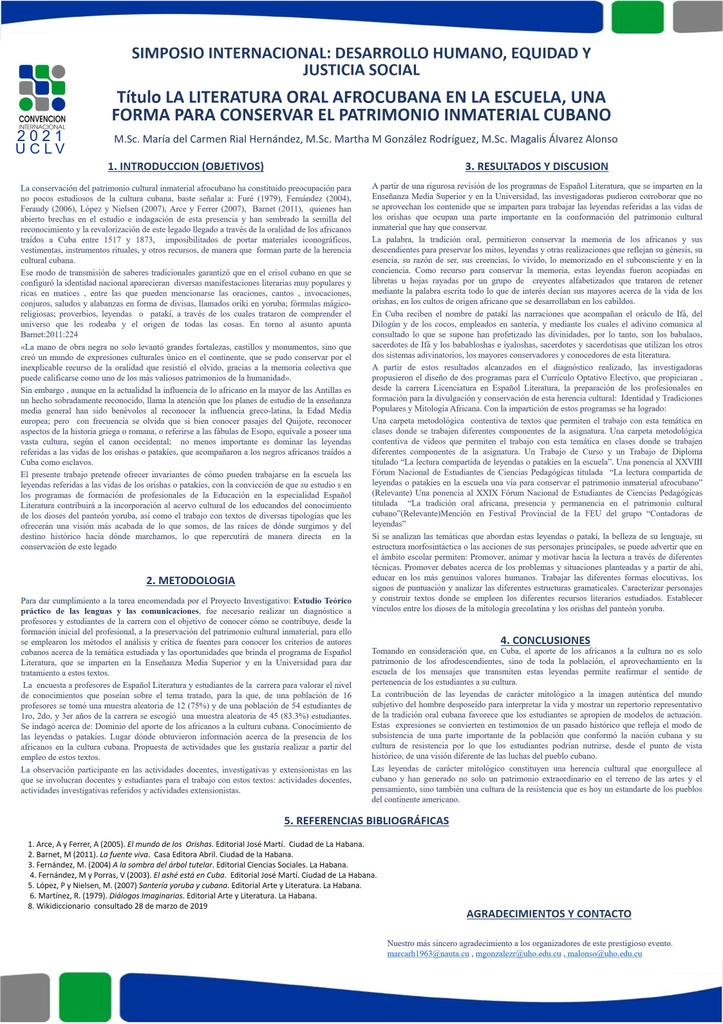Executive Secretary

Simposio Internacional “Desarrollo Humano, Equidad y Justicia Social"

The legends of the oral African tradition constitute a legacy that you contributed to bestow it upon Cuba a face definite, testimony of a historic past and reflection of the mode of subsistence that conformed the nation and his culture of resistance on the side of a population are, you are for it that this cultural inheritance that makes proud the Cuban can not be circumvented. However when to get close to the subject matter, woman investigators, in order to give fulfillment to a task of the Institutional Project: The promotion of the reading: A form to make perfect the process of initial formation and permanent of the professionals of the Pedagogic Sciences, they adminiculated that the study programs of the General Secondary Education do not have provision for the need to dominate the referred legends to the lives of the orishas or patakí that they went with the African black men brought like slaves; In consequence, students do not identify them as part of the cultural immaterial patrimony Cuban. They were used as methods: Analysis and criticism of sources, the observation and the opinion poll. The work is aimed at offering invariantes for the work with these texts at the school. The theoretic referential frame assumes himself as from the offered studies for: Furé ( 1979 ), Fernández ( 2004 ), Feraudy ( 2006 ), López and Nielsen ( 2007 ), Arce and Ferrer ( 2007 ), Barnet ( 2011 ), those who expose how they got to Cuba, how they managed to keep in good condition, what they discuss subject matters and his impact in the popular psychology. The proposal possesses an unquestionable value in the attempt to take care of and to preserve the cultural immaterial patrimony, from the school.
Las leyendas de la tradición oral africana constituyen un legado que contribuyó a otorgarle a Cuba un rostro definitivo, son testimonio de un pasado histórico y reflejo del modo de subsistencia de parte de una población que conformó la nación y su cultura de resistencia, es por ello que no puede obviarse esta herencia cultural que enorgullece al cubano. Sin embargo al aproximarse a la temática, las investigadoras, para dar cumplimiento a una tarea del Proyecto Institucional: La promoción de la lectura: una forma para perfeccionar el proceso de formación inicial y permanente de los profesionales de las Ciencias Pedagógicas, corroboraron que los planes de estudio de la Enseñanza Media General no contemplan la necesidad de dominar las leyendas referidas a las vidas de los orishas o patakí que acompañaron a los negros africanos traídos como esclavos; en consecuencia, los estudiantes no las identifican como parte del patrimonio cultural inmaterial cubano. Se emplearon como métodos: el análisis y crítica de fuentes, la observación y la encuesta. El trabajo está encaminado a ofrecer invariantes para el trabajo con estos textos en la escuela. El marco teórico referencial se asume a partir de los estudios ofrecidos por: Furé (1979), Fernández (2004), Feraudy (2006), López y Nielsen (2007), Arce y Ferrer (2007), Barnet (2011), quienes exponen cómo llegaron a Cuba, cómo lograron conservarse, qué temáticas abordan y su impacto en la psicología popular. La propuesta posee un incuestionable valor en el intento de cuidar y conservar el patrimonio cultural inmaterial, desde la escuela.
About The Speaker

MsC. María del Carmen Rial Hernández
